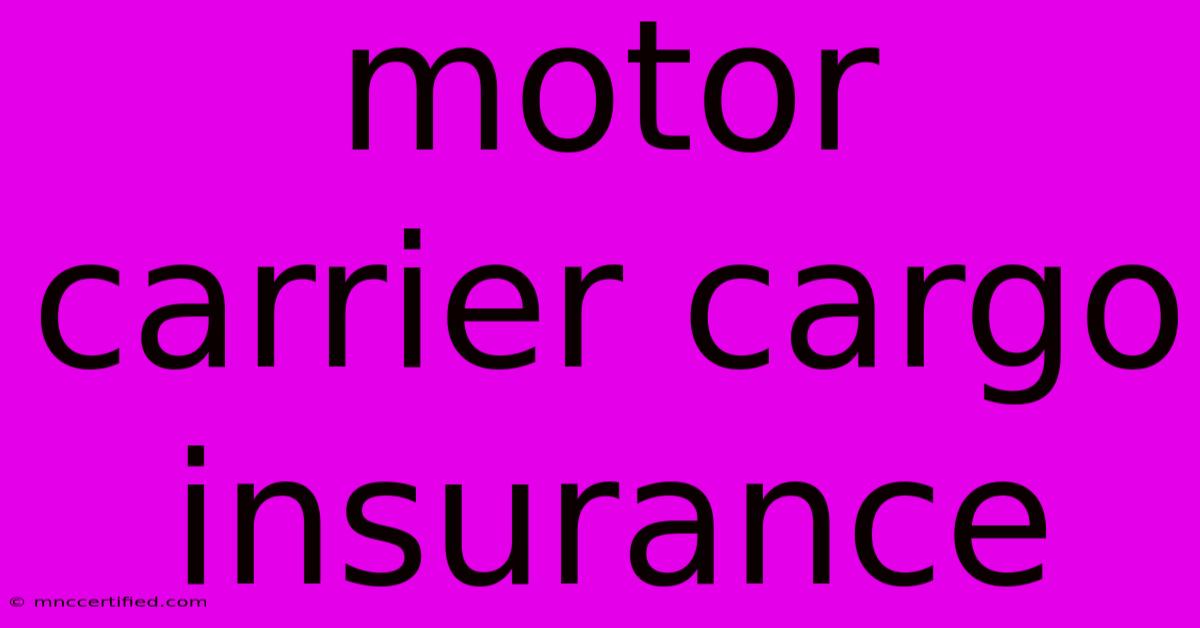Motor Carrier Cargo Insurance

Table of Contents
Motor Carrier Cargo Insurance: Protecting Your Business and Your Clients' Goods
Motor carriers face significant risks when transporting goods. Accidents, theft, and damage can lead to substantial financial losses, not only for the carrier but also for the shipper. That's where motor carrier cargo insurance comes in. This comprehensive guide will explore the different types of cargo insurance, their coverage, and how to choose the right policy for your business.
Understanding the Risks of Motor Carrier Operations
Before diving into the specifics of insurance, it's crucial to understand the potential liabilities involved in motor carrier operations. These risks can be broadly categorized into:
- Accidents: Collisions, rollovers, and other accidents can result in damaged or lost cargo, leading to significant claims.
- Theft and Pilferage: Cargo theft is a major concern, particularly for high-value goods. Even smaller instances of pilferage can accumulate substantial losses over time.
- Weather Damage: Storms, floods, and extreme temperatures can damage goods during transit.
- Accidental Damage: Damage can occur during loading, unloading, or even due to shifting cargo during transit.
- Liability to Shippers: If your negligence causes damage or loss to the shipper's goods, you could be held legally responsible.
Types of Motor Carrier Cargo Insurance
Several types of cargo insurance policies cater to the specific needs of motor carriers:
1. Cargo Liability Insurance (Motor Truck Cargo Liability): This policy protects you against financial losses resulting from damage to or loss of cargo while it is in your custody. It covers your legal liability to the shipper for such losses. This is often a requirement for operating as a motor carrier. Key takeaway: This protects your liability to your clients.
2. Motor Truck Cargo Insurance (Physical Damage): Unlike liability insurance, this policy protects your cargo, covering damage or loss even if the damage is not your fault. This means you are insured against things like accidents not caused by your negligence, or even mysterious disappearances. Key takeaway: This protects your investment in the cargo.
3. Bobtail Insurance: This is specifically for situations where your truck is not attached to a trailer. This coverage protects you against liability and physical damage to your truck during these periods. It is crucial to have if you’re operating without a load or trailer. Key takeaway: Covers your vehicle when not hauling cargo.
4. Cargo Insurance Endorsements: You can often add endorsements to your existing policy to increase coverage for specific situations, such as valuable goods, international shipments, or specific types of cargo. Key takeaway: Tailored protection for specialized needs.
Choosing the Right Motor Carrier Cargo Insurance Policy
The best policy for your business depends on several factors:
- Type of cargo transported: High-value goods will require higher coverage limits.
- Frequency of shipments: High-volume carriers may need broader coverage.
- Geographic coverage area: Your policy should cover the areas where you operate.
- Your financial capacity: Determine the amount of risk you can afford to bear.
- Your insurance broker’s advice: A knowledgeable insurance professional can guide you in selecting the appropriate coverage.
Off-Page SEO Considerations
To increase the visibility of your article, consider implementing the following off-page SEO strategies:
- Link Building: Reach out to relevant blogs, forums, and trucking industry websites to request links to your article.
- Social Media Promotion: Share your article on platforms like LinkedIn, Twitter, and Facebook, targeting trucking and logistics professionals.
- Guest Posting: Contribute articles to other relevant websites to reach a wider audience and build backlinks.
By understanding the risks, exploring the available options, and implementing effective SEO strategies, you can ensure your business is adequately protected and your online content reaches the right audience. Choosing the right motor carrier cargo insurance is a critical step in mitigating risk and maintaining a successful trucking operation. Don't hesitate to consult with an insurance professional to determine your specific needs.

Thank you for visiting our website wich cover about Motor Carrier Cargo Insurance. We hope the information provided has been useful to you. Feel free to contact us if you have any questions or need further assistance. See you next time and dont miss to bookmark.
Featured Posts
-
Western Trading Post Sedona Az
Nov 28, 2024
-
Vic Bond Sales West Branch Mi
Nov 28, 2024
-
300 Millones De Wones A Pesos
Nov 28, 2024
-
Fallout Trading Cards Series 2
Nov 28, 2024
-
Bottled In Bond Jack Daniels
Nov 28, 2024